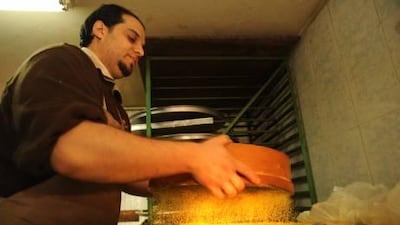NABLUS // Ibrahim Qandilo and Rami Jedan are the odd couple of kunafa.
When not devising ways to artistically display the cheese-filled pastry near the entrance of Arafat Sweets, a restaurant in Nablus, on the West Bank, Mr Qandilo is busy humouring customers into buying heaps of the famed delicacy.
"They put me up front with the customers because I'm sexy," jokes the hefty Mr Qandilo, 30, a cigarette dangling from his lips.
His taciturn partner, on the other hand, mostly toils upstairs, alone, cooking the stuff.
"For me, this is easy to make. For you - very, very difficult," says the 26-year-old Mr Jedan, dark bags hanging under his sleepy eyes, as he flames up a gas stove.
Together, though, Mr Qandilo is the yin to Mr Jedan's yang when it comes to making and selling perhaps the Middle East's most famous, and arguably tasty, dessert.
Every day, the two managers churn out dozens of kilograms of the gooey-centred delight and its thin layers of rust-coloured crust. The men, born and raised in Nablus, kunafa's purported birthplace, see it as their duty to ensure that every gram is made to perfection.
"I started making it when I was 13. I lived between each dish of kunafa. I was raised on kunafa," Mr Qandilo says.
Their expertise is put to use in one of Nablus's most notable makers of kunafa. Since its founding early last century, Arafat Sweets has become a household name not only in Nablus but across the region. The sons of its founder, Rashad Arafat, have gone on to open branches from Amman to Dubai.
But Nablus is the heart of this venerable kunafa dynasty. And kunafa is at the heart of Nablus.
Nearly every thoroughfare, alleyway or city block has at least one confectionery shop serving up the warm dish, and just about every family here has its own recipe.
Two years ago, residents chipped in to cook the largest single piece of kunafa on record, estimated at 75 metres long and weighing more than 1.7 tonnes.
Like waffles to Belgium or cheesecake to New York, kunafa lies at the gastronomical and social core of this mountainous city.
"On special occasions, at weddings, you must serve kunafa. If someone dies, you serve kunafa. If you buy a new car, someone has to serve it to you as a present. If you graduate from high school, it's kunafa. University? Then it's kunafa. Kunafa, kunafa, kunafa," Mr Qandilo explains.
While kunafa dominates the menu, Arafat Sweets also serves other Middle Eastern pastries and confectionery. The restaurant has the most varieties on display in this city of sweet-toothed residents, Mr Qandilo says.
But kunafa is Arafat Sweets' speciality, he says, serving four kinds including the most popular, na'ame or smooth, version and the small wraps of it known as mabrume.
The restaurant's wide selection, jokes Mr Qandilo, has also endeared it to what he describes as Nablus's thriving dentistry industry.
"The dentists love us! They always say, 'You're the best because you make so much business for us!" he shouts.
Back upstairs, though, satisfying Nablus's kunafa appetite is no laughing matter for Mr Jedan. Things must be carried out in an orderly fashion, he says. Proportions have to be just right. Timing has to be perfect.
"This is very difficult," he says
First, vegetable ghee must be spread in a circular fashion on a round, metal vat. Semolina with red food colouring is gently sprinkled on top to form a layer no thicker than the length of a thumbnail.
Then, after being soaked in water to cleanse it of excess salt, a layer of cheese is spread over the semolina.
Mr Jedan stands over the gas stove, quickly - but ever so precisely - spinning the vat with industrial-strength pliers to distribute the heat.
"You have to carefully spin the dish," he says. "You need to make a big circle, every second."
After about seven minutes on the flame, he moves the vat to the side, lets it cool and then flips it top over end onto a tray. With a touch of liquid sugar and sprinkles of crushed pistachios or pine nuts, the steaming orange-red dessert is finished.
"Perfect," Mr Jedan remarks.
Test-buying more than two kilograms of Mr Jedan's product, 36-year-old Ala'a Taweel walks away from Arafat Sweets expecting satisfaction.
He plans to eat it with about 10 friends who are dropping by his home. His assessment of Arafat Sweets' kunafa is the kind of reaction that has brought years of satisfaction to Messrs Jedan and Qandilo.
"Arafat has the best kunafa," says Mr Taweel, who comes here every week after Friday prayers. "The best."

